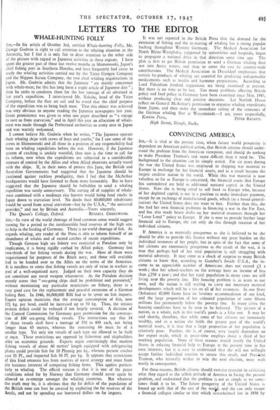The Queen's College, Oxford. RUSSELL GREENWOOD. Sta,—In view of the
world shortage of food common sense would suggest turning for a period to the inexhaustible food reserves of the high seas to help in the feeding of Germany. There is no world shortage of fish. As regards whaling„ any reader of the Press is able to inform himself of an abundance of whales and of record catches of recent expeditions.
Though German high sea fishery was restricted at Potsdam only by implication, it is being rigidly curbed by Allied policy. Germany lost two-thirds of her fishing vessels during the war. Most of them were requisitioned for purposes of the Reich navy, and those still available had to be handed over to the Allies on the terms of the Armistice. It is needless to stress that fishing vessels are only of value in warfare as part of a well-organised navy. Judged on their own capacity they do not constitute any naval weapon whatsoever. As the Potsdam decision merely states that "sea-going ships shall be prohibited and prevented," without mentioning any particular restrictions on fishery, there is a very good case for the replacement and peaceful extension of a German fishing fleet. In 1946, 86,000,000 RM had to be spent on fish imports. Expert opinion maintains that the average consumption of fish, now 12i kg. per head, could be increased up to 50 kg. Thus, the serious protein deficit could be reduced if not largely covered. A decision of the Control Commission for Germany gave permission for the construc- tion of 100 sea-going fishing vessels. The instructions say that 34 of these vessels shall have a tonnage of 350 to 400 each, not being longer than 43 metres, whereas the remaining 66 must be of a smaller type. Yet only ten vessels of each type are allowed to be built at once. These restrictions are opposed by fishermen and shipbuilders alike on economic grounds. Experts argue convincingly that modern fishing vessels of about 60 metres' length equipped with refrigerating plants could provide fish for 18 Pfennig per kg., whereas present catches cost 35 Pf., and imported fish 50 Pf. per kg. It appears that restrictions of this kind emanate less from motives of naval strategy and more from the business interests of competing fishing firms. This applies particu- larly to whaling. The official version is that it is one of the peace conditions asked for by Norway that Germany should never again be allowed to re-emerge amongst the whaling countries. But whatever the truth may be, it is obvious that the fat deficit of the population of the British zone can best be covered by exploiting the fat reserves of the Arctic, and not by spending our borrowed dollars on fat imports. It was not reported in the British Press that the demand for the extension of fishing and the re-starting of whaling has a strong popular backing throughout Western Germany. The Medical Association for North Rhine-Westphalia, supported by universities and hospitals, began to propagate a national drive in that direction some time ago. The plan is first to get British permission to send a German whaling fleet out into Arctic waters, and then to cover the cost by country-wide contributions. The Medical Association in Dusseldorf emphasises that certain by-products of whaling are essential for producing indispensable medicaments such as insulin and hormone preparations. According to Lord Pakenham kindred suggestions are being examined at present. But there is no time to be lost. Too many problems affecting British policy and food policy in Germany have been examined since May, 1945, without producing clear and positive decisions. Let Norfolk House reflect on General McArthur's permission to organise whaling expeditions from Japan, and then order the immediate sailing of the remnants of the German whaling fleet at Wesermilnde.—I am, yours respectfully,


































 Previous page
Previous page